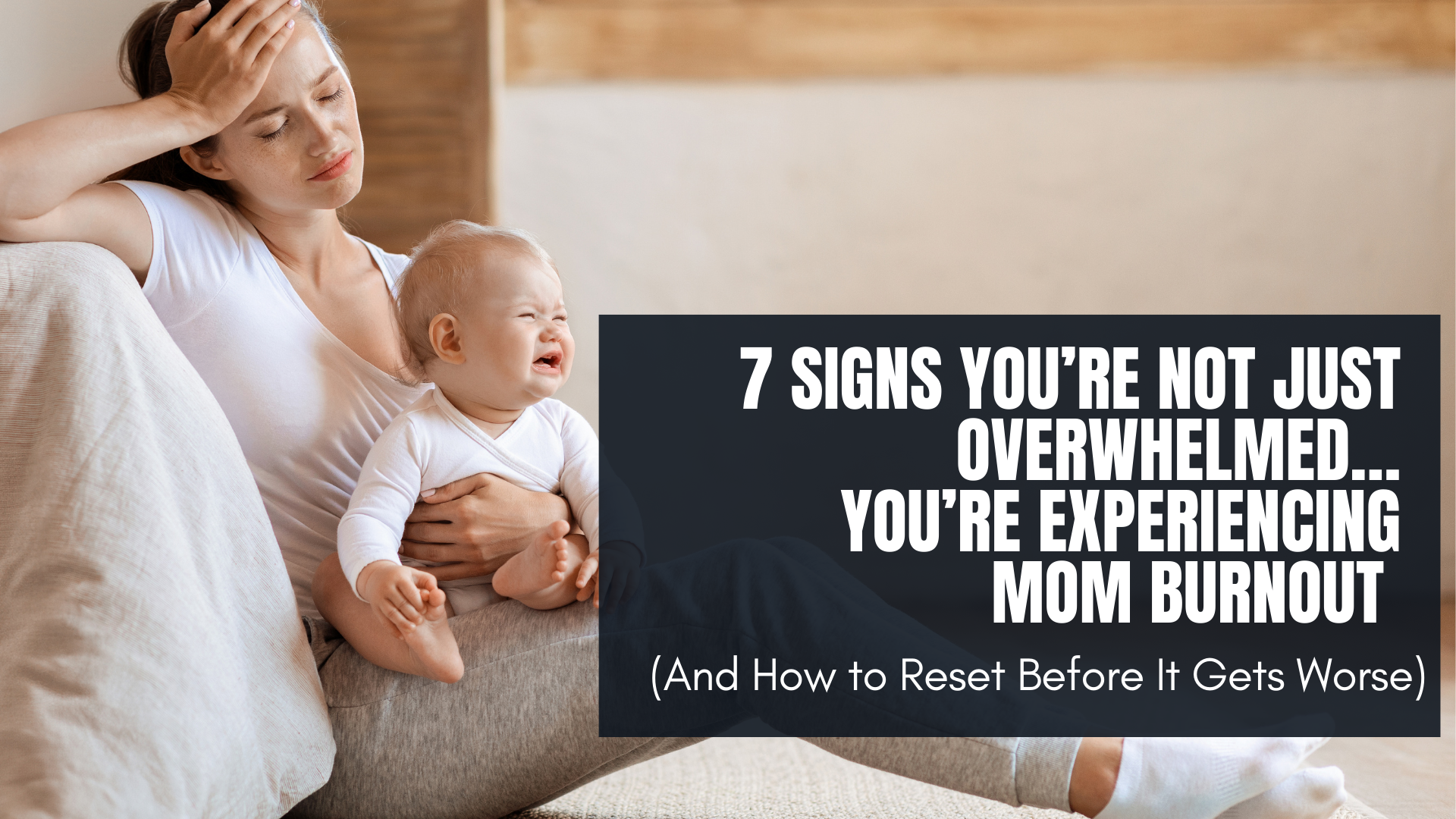You Don’t Need a Full Day Off to Beat Mom Burnout. Try This Instead
Hey mama,
Can we talk about that advice everyone gives burned-out moms? You know the one: “You just need a day to yourself!” or “Take a weekend away!”
While I’m sitting here as a behavior analyst and mom of four (including twins!), I want to scream: WHERE EXACTLY AM I SUPPOSED TO GET THIS MAGICAL DAY OFF?
Between work schedules, childcare logistics, and the guilt that comes with leaving your family for a whole day, that advice feels about as realistic as suggesting we all move to a tropical island. (Don’t get me wrong—I’d take the island too, but we’re working with real life here.)
Here’s what I’ve learned both professionally and personally: mom burnout doesn’t require grand gestures to heal. It requires strategic, small interventions that actually fit into your real, chaotic, beautiful mess of a life.
Why the “Full Day Off” Advice Misses the Mark
The Logistics Nightmare
Let’s get real about what a “full day off” actually requires:
• Finding childcare (and paying for it)
• Coordinating schedules with your partner
• Dealing with the prep work beforehand
• Managing the guilt about “abandoning” your family
• Coming home to twice as much mess and chaos
By the time you’ve organized your day off, you might be more exhausted than when you started.
The All-or-Nothing Trap
This advice creates an all-or-nothing mentality that keeps us stuck. We think we need eight hours of freedom to feel better, so we do nothing while we wait for that perfect opportunity. Meanwhile, burnout keeps building.
The Reality Check
Most moms can’t take full days off regularly. Between work, kids’ schedules, financial constraints, and lack of support systems, it’s just not realistic for most of us. And that’s okay—because it’s not actually necessary.
The Science of Small Wins Against Burnout
As a behavior analyst, I can tell you something fascinating: your nervous system responds to small, consistent interventions just as powerfully as big ones. Sometimes more so.
How Micro-Recovery Works
Your brain doesn’t need hours of rest to start healing from burnout. It needs:
• Brief moments of nervous system regulation
• Small wins that rebuild confidence
• Tiny pockets of joy throughout the day
• Quick resets that prevent overwhelm from building
The Power of Realistic Expectations
When we set achievable goals (5 minutes vs. 5 hours), we actually follow through. And when we follow through consistently, we create positive momentum that compounds over time.
The 15-Minute RESET Strategy
Instead of waiting for that elusive day off, try this: commit to 15 minutes of intentional reset time. Here’s how to make it work:
Choose Your 15-Minute Window
• Before everyone wakes up (yes, I know, but hear me out)
• During naptime or quiet time
• After kids go to bed
• During lunch break at work
• While kids are occupied with screens (guilt-free!)
What to Do in Those 15 Minutes
Option 1: The Sensory Reset
• Step outside and breathe fresh air
• Take a hot shower without rushing
• Listen to your favorite song with headphones
• Drink something warm slowly
Option 2: The Movement Reset
• Dance to three songs
• Do gentle stretches
• Walk around the block
• Do jumping jacks in your living room
Option 3: The Mental Reset
• Journal three things you’re grateful for
• Read a few pages of a book
• Do a quick meditation (apps make this easy)
• Call a friend who makes you laugh
The Key: Protect This Time Fiercely
Treat these 15 minutes like a doctor’s appointment—non-negotiable. Your family’s demands can wait for 15 minutes. Really.
The 5-Minute Emergency Interventions
Sometimes you don’t even have 15 minutes. Here are emergency interventions for those crisis moments:
When You Feel Overwhelmed
• Step outside your front door and take 10 deep breaths
• Splash cold water on your face
• Text a friend: “Having a moment—send good vibes”
• Put on noise-canceling headphones for 3 minutes
When You Feel Touched Out
• Lock the bathroom door and sit on the floor
• Ask your kids for “5 minutes of quiet bodies”
• Put on a movie and don’t feel guilty
• Create physical space however you can
When You Feel Angry
• Count backward from 20
• Squeeze your hands into fists and release
• Say out loud: “I’m feeling overwhelmed and that’s okay”
• Remove yourself from the situation if possible
The Power of Micro-Moments Throughout Your Day
Instead of waiting for big blocks of time, start collecting micro-moments:
Morning Micro-Moments
• Savor your first sip of coffee
• Look out the window before checking your phone
• Take three deep breaths before getting out of bed
Afternoon Micro-Moments
• Feel the sun on your face during pickup
• Notice something beautiful on your commute
• Take a moment to appreciate something your child did
Evening Micro-Moments
• Light a candle during dinner prep
• Listen to one favorite song while cleaning
• Sit in your car for an extra minute before going inside
Creating Your Personal Burnout Prevention Plan
Step 1: Identify Your Burnout Signals
Learn to recognize when you’re heading toward burnout:
• Physical signs (tension, fatigue, getting sick often)
• Emotional signs (irritability, anxiety, feeling numb)
• Behavioral signs (yelling more, avoiding people, neglecting yourself)
Step 2: Create Your Reset Menu
Make a list of 5-minute, 15-minute, and 30-minute activities that help you feel more like yourself. Keep this list handy for when you’re too tired to think creatively.
Step 3: Schedule Non-Negotiable Moments
Put small reset moments in your calendar like any other appointment. Start with just 15 minutes three times a week.
Step 4: Get Your Family on Board
Explain to your family (age-appropriately) that everyone needs quiet time to recharge. Make it normal, not something to feel guilty about.
When Small Interventions Aren’t Enough
Sometimes burnout is deeper than what small moments can address. You might need professional support if:
• You feel hopeless or depressed regularly
• You’re having thoughts of harming yourself or your children
• You can’t find joy in anything anymore
• Your relationships are significantly suffering
• You’re using substances to cope
There’s no shame in needing more support. Sometimes the bravest thing is asking for help.
Your 7-Day Challenge
Ready to try this approach? Here’s a simple 7-day challenge:
Day 1: Take 5 minutes to sit outside and breathe
Day 2: Dance to two favorite songs
Day 3: Take a shower without rushing
Day 4: Call someone who makes you laugh
Day 5: Write down three things you’re grateful for
Day 6: Do gentle stretches for 10 minutes
Day 7: Choose your favorite activity from the week and repeat it
The Truth About Self-Care for Real Moms
Self-care isn’t selfish, and it doesn’t have to be elaborate. It’s about creating small pockets of restoration in your day so you can show up as the mom you want to be.
You don’t need permission to take 15 minutes for yourself. You don’t need to earn it by being the perfect mom first. You need it because you’re human, and humans need moments to recharge.
Your kids don’t need a mom who never takes breaks. They need a mom who models that taking care of yourself is important and normal.
Start Today, Not Tomorrow
Here’s what I want you to do right now: look at your day and find one 15-minute window. Just one. Put it in your calendar with an alarm. When that alarm goes off, honor it like you would any other important appointment.
Because mama, you ARE important. Your well-being matters. And you don’t need a whole day off to start feeling more like yourself again.
Sometimes the most radical thing we can do is take care of ourselves in small, consistent ways. Sometimes the bravest thing is believing we deserve those moments of peace.
You do deserve them. And you can start creating them today.
Ready to move from surviving to thriving without waiting for the “perfect” time? If you’re struggling with burnout and need support that actually fits into your real mom life, I’m here to help. Try 24 hours of FREE coaching with me - because you don’t have to figure this out alone.
Ready to beat burnout without the guilt?
Download my free 5-Minute Reset guide for those overwhelming moments
Consider coaching support if you’re ready to move from surviving to thriving





















